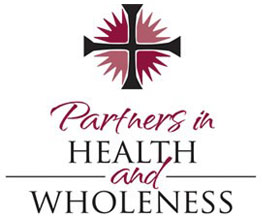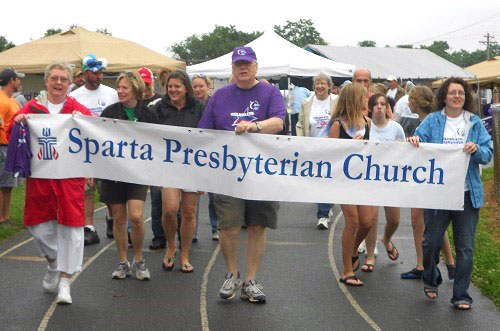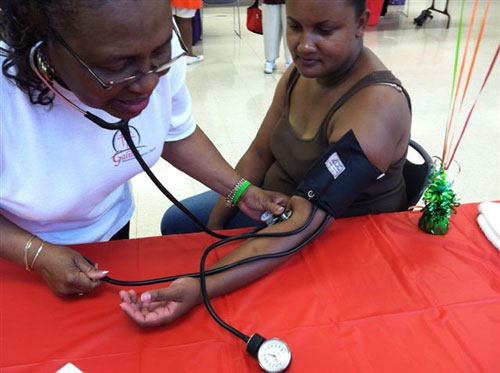Partners in Health and Wholeness
- Need: To lessen the impact of chronic disease and associated complications in North Carolina.
- Intervention: Partners in Health and Wholeness, an initiative of the NC Council of Churches, is a faith-based program that integrates healthy living within congregations while offering financial support to launch or expand health initiatives. The program partners with faith communities in North Carolina to fund and support their health initiatives through collaborative partnerships.
- Results: Since its founding in 2009, over 900 churches have become a part of the PHW, many in rural areas, and over 600 mini-grants have been awarded to congregations.
Description
 Approximately
half of the deaths in North Carolina are caused by
preventable diseases such as stroke, cancer, and heart
disease. With access to over 6,200 congregations, the
North Carolina Council
of Churches has developed a faith-based initiative
called Partners
in Health and Wholeness (PHW) that helps faith
communities integrate healthy living into their
congregational life. By providing tools, resources, and
guidance with a holistic approach focused on the health
of the mind, body, and spirit, PHW helps congregations
lead healthier lives, improving the overall health of the
congregations' local communities. In empowering faith
communities to improve their health and well-being, PHW
aims to improve the health outcomes of people across the
state.
Approximately
half of the deaths in North Carolina are caused by
preventable diseases such as stroke, cancer, and heart
disease. With access to over 6,200 congregations, the
North Carolina Council
of Churches has developed a faith-based initiative
called Partners
in Health and Wholeness (PHW) that helps faith
communities integrate healthy living into their
congregational life. By providing tools, resources, and
guidance with a holistic approach focused on the health
of the mind, body, and spirit, PHW helps congregations
lead healthier lives, improving the overall health of the
congregations' local communities. In empowering faith
communities to improve their health and well-being, PHW
aims to improve the health outcomes of people across the
state.

Faith communities partner with PHW by designating a liaison (health lead) to communicate with the PHW Associate Director for their region (Western North Carolina, Eastern North Carolina, and Central North Carolina) or Associate Director for their health focus area. The PHW Collaborative is open to any faith community that holds regular religious services in an established place of worship. They welcome partnerships with communities of all faith traditions.
The first step to joining the PHW Collaborative is filling out a Collaborative Pledge Form, which indicates a faith community's commitment to continuing to put faith into action and allows PHW to better get to know that faith community.
Once a Collaborative Pledge is accepted, the faith community is eligible for a grant from PHW. PHW awards grants to faith communities who have a specific project or program that needs funding. The program currently offers three types of grants; a mini-grant, community grant, or other one-time grants that currently includes a BIPOC Mental Health Grant, A Harm Reduction Grant and Tobacco and Nicotine Education and Awareness Grant that can be used to fund a health-related initiative related to healthy eating, physical activity, mental health awareness, healthy aging, tobacco and nicotine education, Harm Reduction, or HIV Education and Awareness, depending on which grant is being applied.
A Director, three Associate Directors, and a Program and Engagement Administrator are available to work with health leads to conduct site visits, evaluate existing programs, and assess a congregation's potential to launch PHW health-related initiatives. The staff also organizes peer-to-peer learning opportunities that provide a way for different faith communities to interact across geographic, racial, denominational, and socioeconomic differences.
Other resources provided by PHW include:
- Workshops, called Sacred Conversations and Faith and Health Connections, which are held in person and virtually, with recordings of select events available.
- A searchable resource page that includes past newsletters, partner/resources by health focus area, category, audience and coming in 2023 by county/city/geographical location.
PHW partners with many different organizations that support the work of this program and other initiatives of the North Carolina Council of Churches. Other partnering organizations include:
- NC Oral Health Collaborative
- Resourceful Communities
- Rural Forward
- North Carolina county health departments
- North Carolina ministerial alliances
PHW is supported by grants from The Duke Endowment, Open Society Foundations, and the Wake Forest University School of Divinity COMPASS Initiative Faith Coordinating Center.

Services offered
PHW Collaborative Pledge – The first step for a congregation is to solidify their partnership with Partners in Health and Wholeness and their commitment to integrating health and faith.
Grants – After being certified, congregations are invited to apply for a mini-grant up to $1,000. Examples of initiatives funded by mini-grants include:
- Health fairs
- Community gardens
- Healthy snacks and church meals
- Cooking demonstrations and equipment
- Walking trails or tracks on church grounds
- Tobacco and nicotine cessation efforts
- Exercise classes led by personal trainers or fitness instructors
- CPR/First Aid training
- Breastfeeding promotion
- Bulletin inserts featuring health tips
- Participating in races, walks, and relays
- Community outreach regarding health
- Active church outings
- Defibrillator use and maintenance
- Health assessments and regular blood pressure, blood sugar checks
- Healthy food pantries
PHW hosts an informational page on their website with more information about certification and mini-grants.

Results
Since its founding in 2009, over 900 churches have become a part of Partners in Health and Wholeness and over 600 mini-grants have been awarded to congregations throughout North Carolina.
Read how one PHW-certified congregation, Conetoe Baptist Church, launched a garden camp through the Conetoe Family Life Center in the RHIhub's Rural Monitor.
Challenges
Launching Partners in Health and Wholeness initiatives is not always a smooth process for a congregation. Below are some issues PHW has noticed and tips for how churches can overcome them:
- Once a faith community launches a new initiative, getting congregants to participate is not always an automatic process. It takes hard work, much communication, and intentional relationships to get people on-board and earn their trust.
- Some congregations are not used to having unscripted guidance when expecting a packaged program. The PHW staff stress the need for programs to be contextual. The construction of the program will depend on the immediate health needs in the community, the commitment of the faith community members, and the resources available.
- Some health issues require coordinated community efforts to actually shift systemic factors impacting health that cannot be changed solely by changes to individual health behaviors. Maintaining long term community-scale efforts requires faith communities to continue working together.

Replication
Below are things that PHW regional coordinators suggest to keep in mind when launching a new initiative:
- Leadership is very important. Try to recruit a health lead who is well-respected in the faith community and make sure the other church leaders and staff support the plan.
- Use a faith community's natural gifts and passions to develop new initiatives. For example, if people are more excited about physical activity than nutrition, help them create a walking program as a first step. Then, build on this success to begin addressing harder lifestyle changes.
- Keep faith practices at the forefront of each initiative because that is where the connection, motivation, and conviction for the congregation comes from.
- Be gentle. People will most likely break the health rules they set for themselves in their pledges and fall short of their goals, but offer grace. Give your lay leaders, faith communities, and clergy plenty of second chances.
- Keep moving. If you started with 10 people, but folks have dropped out, stay the course with those who are committed. Change is still a possibility with a few people.
Contact Information
Nicole Johnson, Program DirectorPartners in Health and Wholeness
919.828.6501 ext. 110
nicole@nccouncilofchurches.org
Topics
Community and faith-based initiatives
Networking and collaboration
Public health
Wellness, health promotion, and disease prevention
States served
North Carolina
Date added
August 3, 2016
Date updated or reviewed
December 9, 2022
Suggested citation: Rural Health Information Hub, 2022. Partners in Health and Wholeness [online]. Rural Health Information Hub. Available at: https://www.ruralhealthinfo.org/project-examples/920 [Accessed 25 April 2024]
Please contact the models and innovations contact directly for the most complete and current information about this program. Summaries of models and innovations are provided by RHIhub for your convenience. The programs described are not endorsed by RHIhub or by the Federal Office of Rural Health Policy. Each rural community should consider whether a particular project or approach is a good match for their community’s needs and capacity. While it is sometimes possible to adapt program components to match your resources, keep in mind that changes to the program design may impact results.
